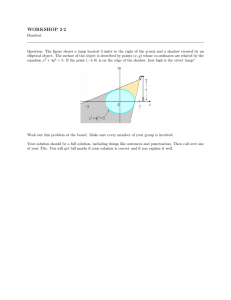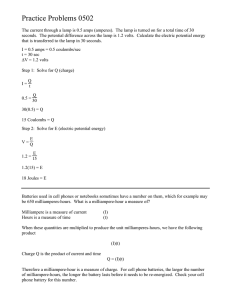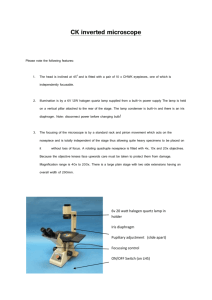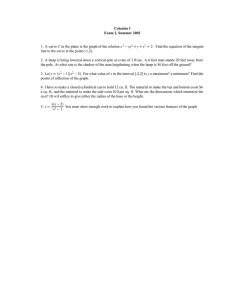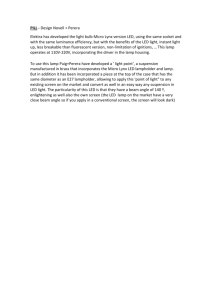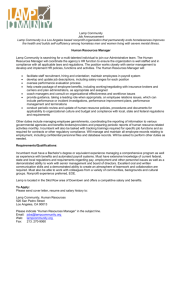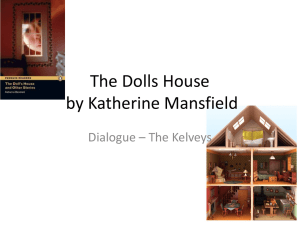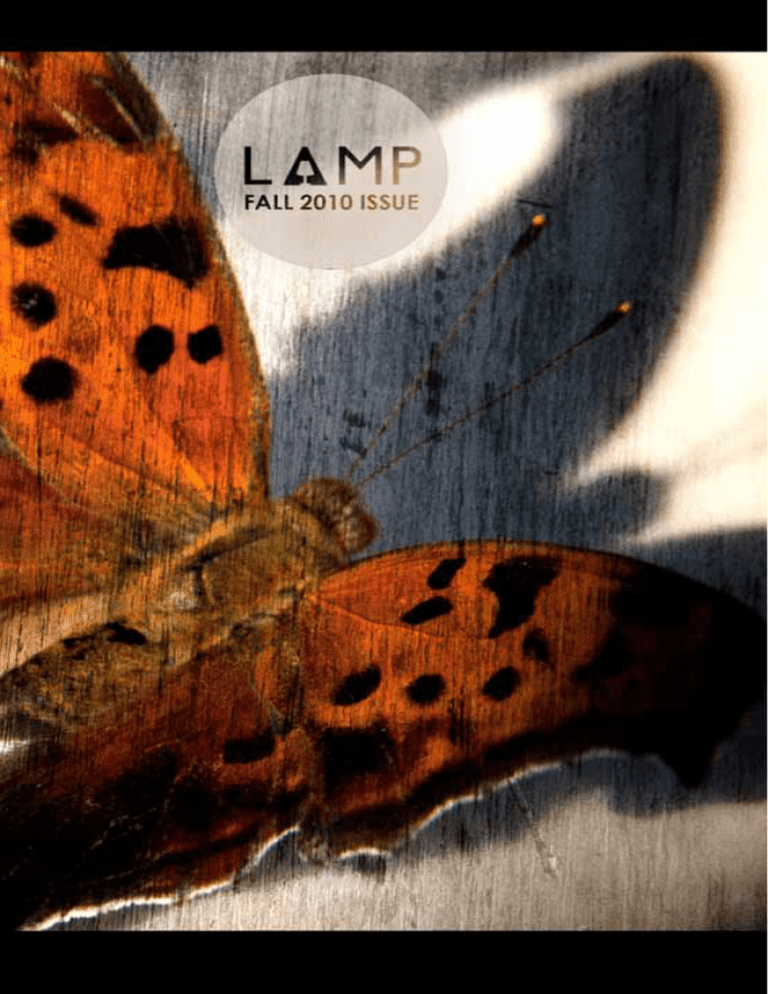
Chelsea -from City Series
by Cara Michelle
2
LAMP
LAMP is a literary magazine which publishes creative pieces
and critical essays written by current students and alumni
of Liberty University; the views expressed are those of
the contributors and do not necessarily reflect those of
the LAMP staff or Liberty University. LAMP aspires to
stimulate readers both within and outside the University
with the creativity and critical work of its contributors.
The LAMP staff would like to thank Mr. Danny Horsley
and Seckman Printing for the printing of this issue. Their
generosity has helped to make this issue possible. Visit them
on the web: http://www.seckmanprinting.com.
All rights reserved. No part of this publication may be
reproduced without prior permission of the publisher.
© (2010) Liberty University.
General Faculty Advisor
Graphics / Layout Faculty Advisor
Prof. Chris Gaumer:
Professor Edward Edman
General Editor
Nick Olson
General Editor
Andrew Walker
Graphics / Layout Editor
Cara M Williams
Advertising
John Gosslee
Readers:
Elizabeth Cook
Lauren Hoessley
Jill Johnson
Beth Jones
Brittany Meng
Amanda Patten
Rebekah Ricksecker
Joe Walls
Nathan Valle
LAMP
3
LAMP
Contents
Fall 2010 - ISSUE
2 . . . . . . photography. . . . . . . . . Chelsea :from City Series
Cara Michelle
4 . . . . . . photography. . . . . . . . . Ancient Meets Modern
Mallory Joy Barks
6 . . . . . . short story. . . . . . . . . . .Blue Rubies
Carly McClure
9 . . . . . . photography. . . . . . . . . Untitled
Julie Sagard
10 . . . . . poetry. . . . . . . . . . . . . . Poverty
Samantha Futrell
11 . . . . . photography. . . . . . . . . La Mujer Misteriosa (The Mysterious Woman)
Jonathan Morales
12 . . . . . creative non-fiction . . . The Day I Saw Mr. Gibbs Cry
Elise Peer
15 . . . . . photography. . . . . . . . . Time
Cara Michelle
16 . . . . . poetry. . . . . . . . . . . . . . Trevi
Lydia Christoph
17 . . . . . photography. . . . . . . . . Bike
Duc Pham
18 . . . . . photography. . . . . . . . . Midtown :from City Series
Cara Michelle
19 . . . . . short story. . . . . . . . . . .The Flame
Joseph Walls
22 . . . . . photography. . . . . . . . . Growing Old Benches
Zachary Welch
23 . . . . . poetry. . . . . . . . . . . . . . Fire Place
Lauren Peacock
24 . . . . . photography. . . . . . . . . Wedding Gazebo
Zachary Welch
25 . . . . . poetry. . . . . . . . . . . . . . Procession
4
LAMP
Jonathan Devin
26 . . . . . essay. . . . . . . . . . . . . . . Reflection
Michael Huesser
29 . . . . . photography. . . . . . . . . Flat
Cara Michelle
30 . . . . . poetry. . . . . . . . . . . . . . Birch
Christen Carrier
Ancient M
eets Moder
n
by M allory
Joy Barks
FRONT AND BACK COVER BY CARA WILLIAMS
LAMP LOGO BY JOHN CARL
LAMP
5
Blue Rubies
Carly McClure
There are people in this world that startle you. There are things about this world
that surprise you, things that leave you wondering if being born was a good thing.
These things are hidden in dark corners of the earth, and the light that feebly tries
to permeate such corners is lost in the fog of human destruction. I found a man, an
article, which reminded me of the feeble light inside of me. I would try, I promised,
to be a light. This is what I thought as I knocked on the door of the home of Walter Dodge.
“I have to admit, I’m surprised you came by. This isn’t exactly new news.”
“I read your piece in the L.A. Times. I have lots of questions for you.”
“That piece is fifteen years old. You didn’t just stumble on it. You were searching
for it.”
“Like I said, I simply read it and was curious.”
We sat in a room lost in the glow of the afternoon sun. The worn chairs squeaked
when we both reached for our water glasses, the fogged sweat dripping down on to
the table. A coaster was given to me and I nodded my thanks. I toed the edge of the
fraying Oriental rug with my Oxfords and noted the stains on the carpet, four perfect
circles from where the chair once sat.
“You moved the chair.”
“Away from the window. As you can see, it gets hot in the sun.”
“You sit in here a lot, then?”
“No.”
The grandfather clock in the next room startled me as it chimed three times with
resounding clangs. I shifted in my seat, re-crossed my legs.
“Mr. Dodge.”
“Walter, please.”
I nodded to him, like a young reporter.
“Walter, I just want to hear the story from you.”
“You mean my fifteen year-old story. Why are you digging up bones, son?”
“It’s important to the world… we’ve already forgotten. You do think it’s important, right?”
6
LAMP
The old man let out a steely laugh.
“Who do you think you are? A young reporter like yourself, straight out of Yale,
ready to take on the world and expose us for what we are, is that it? Bring humanity
to the inhumane? With words?”
I looked down at my hands, at my blank notepad. Walter shook his head and continued.
“You read my article. You read about the genocide I witnessed, about the war I
found myself in. And now you live in the world after my article. It sensationalized
the media for almost two weeks. Fifteen years later, Africa is still the same. No, no,
Africa is worse.”
“Your efforts weren’t lost, though. I read about a group of students who went over
to dig wells, and the Wallstreet Company that dropped water and clothing…” I
quickly flipped through the folder on my lap. “Yes, here is an article about a new
policy developed by the Peace Core, it states of a three-year agreement—”
“I know what it says.”
“So, you see, then that you made a difference, however small.”
The clock ticked by memories. The room smelled a bit stale, of old dust and old
wood, as if removed from time. I could see dust falling and rising in the sporadic rays
of light streaming in through the window.
“This place was so
dark you couldn’t see
your moral hand in
front of your face.”
Looking over at the old man and seeing the
contrast between us was chilling. Walter had
the darkest eyes I had ever seen.
“There was a young boy there, in Kigali. He
was trying to sell me blue rubies. Of course,
there are no such things, but he really believed
the stones he had were blue rubies. At first, being a greedy American, I thought
maybe he had sapphires. I bought two or three from him for nigh a nickel a piece. I
sent them off to be inspected, but never heard back. They probably didn’t even make
it out of the country.”
My pen scratched across my paper in a fury, as if of its own accord.
“I stayed in the country for another two weeks after that. It was a hard place. Death
followed me everywhere and I developed a certain paranoia that could only come
from Africa. Have you read Conrad’s work?”
I nodded, startled to be addressed.
LAMP
7
“Conrad’s Darkness was nothing compared to this place. More like a light fog. This
place was so dark you couldn’t see your moral hand in front of your face. Demons,
demons everywhere, and I couldn’t do anything about it. Do you understand how
frustrating that is? I woke up to gunshots in the night, but this was only a nightmare
of a vacation for me. This was life for them.”
I tried to wait patiently for Walter to continue. He took a slow drink from his glass
and set it back down, perfectly centered on the coaster.
“I saw the boy only once more. I bought all of his so-called rubies from him for all
the cash I had on me, almost five hundred dollars. I was air-lifted out two days later,
the borders were hot with blood, and the Militia was…well, you know the rest.”
“What happened to the boy?”
Walter said nothing.
“Walter, what happened to the boy?”
The old man stared at me with those dark eyes.
“I don’t remember,” he said firmly.
“I don’t believe you.”
“When I got back to the U.S., everyone expected me to pump out some article. I
couldn’t. I quit.”
“But you wrote one.”
“A year later, I wrote the first article about it. I wrote a book, also, but I burned the
manuscript.”
“You what?” I nearly jumped out of my chair.
Walter Dodge’s glass was empty. He reached with shaking hands to flatten what was
left of the salt-and-pepper hair on his head.
“Sir, what happened to the boy?”
The edge to Walter’s voice was too hard for a normal man.
“I found him in the street the next day, decapitated. The machete had ruined his body,
but I recognized the face.”
He turned and looked at me, with my pen mid-air, the breath gone from my lungs.
“I killed him,” he said. “I killed him with goodwill and five hundred dollars. That’s
the real Africa, son. Wells and free clothes will do nothing.”
8
LAMP
Walter Dodge and I are alike. When I left his house that day, I left my notepad in the
chair where I had sat. I guess we both knew things, that day, which we couldn’t quite
bring to light. Sometimes, the darkness is just too dark. I sincerely hope he burned
my notepad. I picture him laying the ashes of our conversation with the ashes of his
burned manuscript, a memorial for all the blue rubies.
aga
by Julie S
ard
Rust
LAMP
9
Poverty
Samantha Futrell
My Father took us to the garden
where the dirt came high
and our feet were
marred with color by trodden ground,
glass and tin flowers growing deep.
Metal animals pulsed hard
outside our garden
as he sat us down on that bony bed
to sleep and wait.
Pale dresses make dark skin Louder,
I did not mind the stainsbut plaster weeds of humanity
don’t stop
crunching
don’t stop
creaking
don’t stop
cracking
no matter how thick the sleep.
10
LAMP
La Mujer Misteriosa (The Mysterious Woman)
by Jonathan Morales
LAMP
11
The Day I Saw Mr. Gibbs Cry
Elise Peer
Odors associated with waiting rooms and hospital beds permeated the stifling air as
my family uneasily made their way down the never ending hall. I followed closely
behind my younger brother. Feeling very uncomfortable, I prepared an uneasy smile
as I walked inside the small room. We had arrived: room 214.
As we entered my grandmother’s room – which was located in an undersized
nursing home in West Virginia – we walked past her roommate, Helen, and nodded
pleasantly. My grandmother, a temporary and rather disgruntled inhabitant, due to
the fact that her oldest son was on vacation, lay on her bed. Rather startled at seeing
us, she slowly sat up. Becoming extremely excited, she began to talk about all of the
typical “family news.” Meanwhile, sitting on the other side of my grandmother’s
bed, I was able to take in the rather depressing scene.
Directly in front of me, I could observe the ongoing “traffic” outside her door. To my
left, her roommate now lay sleeping. Glancing around, my heart sank as I observed
the lone window and took in the dismal view. Returning from my subconscious
thoughts, I noticed there was a lull in the conversation. Feeling the need to continue
conversation with my grandmother, my father stated with encouragement, “Before
you switched rooms, all you could see was the grass embankment. Now you get to
see the courtyard and the elementary school! That must be nice!” My dad did not
mention the fact that the “courtyard” was the size of a large bathroom and had not
been mowed in what appeared to be several months. He also did not mention that
the “great view” of the elementary school consisted of the lonely backside. Feeling
sick, I pushed the unsettling thoughts from my mind and grappled with the ever
increasing feelings of loneliness and despair that permeated the small room.
As my family talked, forming a cluster, an elderly man wheeled into the room. He
acted as if he had always belonged with us, and his countenance revealed just a hint
of a smile. He was confined to his wheelchair, obviously due to his nonexistent left
leg. He joined us and positioned himself next to my mother. Slightly disconcerted,
we strived to keep the status-quo, all the while being sure to smile politely and nod
every so often.
My grandmother, becoming slightly annoyed, was not so inclined, and felt it her
duty to discover the true intention of the elderly man’s visit. “Is there something
12
LAMP
you want?” No answer. “Well then, I think you should leave,” my painfully bold, yet
sweet, grandmother declared.
My mother stepped in, deciding on a different approach, “What is your name?” she
asked kindly. There was still no response.
My mother tried again. “Can you tell us your
name?” The seemingly nameless man looked
at her, and, for a moment, I could tell he was
laboring to speak, but, finally, he just shook
his head. I sat there in disbelief, as I realized
he did not possess the ability to speak. His
mind was obviously intact, as evidenced by
“As the man sat there,
recovering from his
evident grief, all others
in the room faded
into nonexistence.”
the direction of his nod when responding
to my mother’s various questions. Feeling my heart break, I sat motionless as I
contemplated such a painful existence. The elderly man proceeded to take my mom’s
hand in his and give it a kiss. Painful awkwardness filled the room. Meanwhile, my
poor father was desperately trying to distract my greatly agitated grandmother.
Proving her son’s efforts were in vain, my grandmother, being greatly annoyed,
shouted, “Stop flirting with my daughter-in-law! She’s taken!” Upon this outburst,
the elderly man, to my utter shock, broke down and began to weep. I began to feel
sick; I felt as if something were being torn out of my very being.
Struggling to breathe, I leaned over to my brother, who stood directly behind
me, and whispered hoarsely, “Being here, seeing this; it makes me want to scream
hysterically, run out of here, and break down all at the same time.” My brother
nodded understandingly.
Silence filled the room.
Not knowing what to do or say, my father started conversation again. As the
man sat there, recovering from his evident grief, all others in the room faded into
nonexistence. All that I was capable of witnessing was this man and my mother’s
attempts at consoling him. Once he regained composure, my mother decided to try
again: “Do you have any family?” He shook his head no.
Uneasy thoughts filled my mind. “Who was this man? Who was he truly? I wondered
what he was thinking. Was he once like me? Did he ever have hopes, dreams, victories,
and aspirations or was he merely some old guy in a wheelchair that couldn’t talk? I
slowly started to realize how so many of us view the elderly, and the revelation filled
me with disgust.
LAMP
13
As he continued to kiss my mother’s hand repeatedly, she asked him tentatively, “Do
I remind you of your wife?” He shook his head yes, then, once again, he immediately
broke down. My heart fell below my feet. Knowing full well that I would never be
able to comprehend the pain inside his heart, I wondered if anyone ever even visited
him. I wondered how he was able to cope without his wife and his family. He couldn’t
talk, and he couldn’t walk - a soul trapped inside a broken and lonely human body.
My eyes began to glaze over as a young nurse came in to take him away.
My mind raced, “Where are you taking him? Who is he? Who truly cares about
him?” As the nurse began to wheel him out of the room my mother asked for his name.
“Mr. Gibbs,” she replied. With his wheelchair facing the exit door, his back facing us,
already half way out of the room, my mother called, “Goodbye, Mr. Gibbs.” That
was the first and last time I ever saw him.
Once in the parking lot, I walked alongside my younger brother. “Evan?” I inquired.
“Huh?”
“That whole experience back there really makes you think, you know? I think we
need to make a pact.”
“Oh?”
“Yeah, we’re never going to send mom or dad to a place like this, even if it kills us. I
mean, there are five of us kids, so it shouldn’t be that big of a deal, right?”
“I guess not,” he shrugged, “but I don’t know. Sometimes that’s what you have to do.”
“No,” I answered firmly. “Can you imagine putting them through that? That! In
there!” I emphasized. “Is that what you want? For our sake alone, we can’t do that.
Visiting them and seeing them surrounded by people who are losing their minds,
trapped within their own bodies, would tear me apart. I don’t think that I could live
through that.”
I fell back and slowly made my way to the car. I was relieved to be outdoors. The
fresh night air revived my senses, and I heard the crickets playfully chirping in the
distance. I breathed it all in and smiled. We were finally going home! And, then, it
hit me: Mr. Gibbs was not.
14
LAMP
Time
by Cara Michelle
LAMP
15
Trevi
Lydia Christoph
The girl in red stood
Smoking a lonely cigarette
Beneath the streetlamps.
The flickering lights in the fountain,
And the wind-wafted spray
Shimmering on the cobblestones,
Reflected in her waves of onyx hair.
Marble-carved in Clement’s fountain-The grandest in all of Rome-Neptune stares at her impassively.
The ancient Titan had stood watch there through
The triumphs of Spanish explorers,
The glory of Italian Renaissance artists,
The fall of Constantinople,
The blood of German reformation,
The rise of the British Empire,
Insurrections, wars, vendettas-In the palace wall at the head of the piazza.
He had laughed in the face of the liberating Spitfires,
Their spread-eagle shadows leering over him
As scarlet fire from the devastation
Had stained the water with blood.
He had listened to the pleas of ten thousand supplicants,
Their countless pennies splashing in his coffers,
He, as impotent to spend the treasure
As to grant the prayers of the tourists.
16
LAMP
Bike
Neptune watches
As a young man in a corduroy jacket
At last arrives,
by Duc
Pha m
His steps slow and shambling
His air regretful but aloof.
He avoids her reddened lips,
But perfunctorily kisses her cheek.
She murmurs a question.
He just nods; he won’t look at her.
He turns and walks away.
Then the tears come, slipping down her cheeks,
Shining in the lights of the fountain.
The cigarette falls from unfeeling fingers
And is ground out desolately with the toe of her stiletto.
And Neptune realizes, from his marble throne,
Atop his water-kingdom,
Infinitely smaller than his fabled oceans,
That Cupid is just as powerless as he,
Frozen in Cararra marble,
In a piazza far away.
LAMP
17
Midtown -from City Series
by Cara Michelle
18
LAMP
The Flame
Joseph Walls
The snow began during the brown, frozen afternoon and blew horizontally between
the tall Bostonian buildings until there was a white blanket of powder on the
pavement. It had been an abnormally cold November that year, and the weathermen
of four different local news stations had prophesied about the coming of blizzards
since Thanksgiving. They turned out to be false prophets—no snow came until
December 7th, and that blizzard appeared unheralded. Nobody had time to ransack
the supermarkets for milk, eggs, or cheese. The storm came out of nowhere and
settled on the city.
In an old, squat apartment complex—a redbrick dwarf among several more
impressive buildings—Saunders spent the afternoon looking out of the window,
watching the snow pile up on the rusty fire escape. Far below, in the street, he saw
huge plow trucks, gray with their own salt, pushing aside the first layer of powder.
It looked like sugar at first—then, later that night, a thick layer of frosting. He
wondered if the men in the trucks (they must have been stubble-faced, strong-jawed,
plaid-wearing men, like his father) ever looked up at the strands of Christmas lights
in the windows. They probably did. Maybe the lights even calmed them.
Saunders had yet to put lights in his window that season. He didn’t feel calm.
Something was escaping him—something being buried before his eyes, and the
longer he stood motionless, the less chance he had of recovering it. He paced the
creaking floors of his small, tidy apartment and paused at the frosted window, gazing
at the outside world. When night fell, the snowscape looked far different. The snow
became gray, and the sky was a deep burgundy color.
The only light in the apartment was the flashing blue luminance of a TV screen. It
was a Christmas special; a group of innocent looking children were singing:
“. . . All is calm, all is bright
Round yon Virgin Mother and Child . . .”
His TV was on mute, but he could hear the same music from somebody else’s
apartment bleeding through the wall. Saunders wanted to turn up the volume, but
he hadn’t the heart to do it. There was something heartbreaking about that story,
and he wanted to block it out. To pretend the story was true would be like believing
that the stains on his bedroom ceiling were stars. It was so unfair that he had to live
in a world with a roof over it.
LAMP
19
It’s just like that day when I was a young, he thought, that hot day in May when
they told me he wasn’t real. The thought kept pressing in on me when I’d lie in bed
at night, mulling things over—but I kept rejecting it. I didn’t want it to be a myth. I
wanted him to be real, so I kept the thought out. I guess they didn’t mean any harm
by lying to me all those years—it kept me from being bad, anyway—but I wish they
hadn’t told me the truth.
The disillusionment had occurred in a classroom. Sweat had been dripping off the
end of Saunders’ nose and chin, and the lights were turned off to try and reduce
some of the heat. Saunders remembered how his glasses kept slipping down his face,
and how the tears and sweat made the lenses hazy. The Christ Myth, the teacher called
it. The phrase stuck with him, and it penetrated his defenses one night while he
was thinking it over again. It slipped in without much resistance. No baby Jesus. No
angels. No wise men. No Virgin Mary—especially no Virgin Mary.
The teacher—a portly old man with a young man’s haircut—looked down at the
children with a steaming face, his own glasses as foggy as a frosted windowpane,
and said, “We know this because other cultures have had Holy Mothers. Artemis, the
pure huntress and protector of children, was one. Aphrodite was far from being a
virgin, but she still bore Eros (or Cupid) under mysterious circumstances. Just like
Jesus,” he paused to look at young Saunders, who was burying his burning face in
his folded arms. “What’s wrong, son? Don’t you like learning about mythology?”
Saunders didn’t answer.
“Horus, the Egyptian holy child,” continued the teacher, “was both the son and
husband of his mother Isis. A savior born to a female—who was just a reincarnation
of his father. Sound familiar? The legend says that Isis conceived him by way of a
holy fire. But we all know that it takes what to conceive a baby?”
“Sexual intercourse” said the chorus of boys and girls. The man’s shining round
head glittered like glass as he nodded.
It was becoming dreadfully hot in the apartment, so Saunders turned down the
thermostat and decided to go outside for a walk in the snow. He pulled on his
grandfather’s tattered old boots, a heavy gray overcoat, and wound a scarf around
his neck. Yellow light burst into the room as he opened the door and stepped into
the hallway. As he walked past his neighbor’s door, a mechanical motion-detecting
Santa on the welcome mat did a hula dance. He wanted to knock it over, but he passed
by without touching it. Then Saunders descended the stairs that—when they were
wet—always smelled strongly of the rubber, no-slip treads. His boots squeaked with
every step. When he came to the glass double doors, he put his hand on the cold
20
LAMP
metal handle and looked out at the swirling snow. There was nearly four inches on
the tops of parked cars, trashcans, and mailboxes.
As he stepped outside, a gust of frigid air blew into his flushed face, making his
cheeks burn. The flakes fell large and wet, and they clung to the top of his arms and
shoulders. He looked down the narrow street at the row of streetlights. Each lamp
seemed to be trudging through the drifted snow in a long processional, a halo around
every glowing head. They gave everything a gilded color: the wrought iron fences,
the buildings, and even the air around him. The fallen snow and cloudy sky tossed
light back and forth to one another, making the road strangely bright and inviting.
He walked faster, sucking in copious lungfuls of air and expelling them in billowing,
golden clouds.
An Angel appeared to Joseph in a dream, thought Saunders. He knew the passage
well. Fear not to take unto thee Mary thy wife: for that which is conceived in her
is of the Holy Ghost. Conceived of the Holy Ghost. It was such a pretty thought.
He left footprints on street after street, only to have the wind cover them again with
snow. Finally, unsure of where he was, he stopped and turned his head eastward.
There, up ahead, was Old Ironsides sleeping lazily in the water, looking as though she
“The sudden shift wasn’t
something he had planned
or even expected, and
somehow that made
all the difference.”
would shake the snow from her masts
at any moment. He approached her
until he could hear the water lapping at
the hull. The black harbor lay behind
her, endlessly receiving the flurrying
snow. Far out at sea, he could see the
colored clouds breaking and a patch of
faint stars becoming more distinct.
Now when the fullness of time had
come, he thought, dreamily. That was another nice phrase—the fullness of time. It
suggested a sort of pregnancy, as if the heavens were full and ready to burst.
Out on the pier, snow blew in drifts, like sand in some small Palestinian town.
Those few bright stars kept singing to him from their high places, and he knew
how glorious it felt to have his two boots planted in the snow. Somehow, God was
God, and Saunders was himself--a man wearing wool socks, whose ears, nose, and
chin were numb from cold. Something like belief suddenly came to him like a gust
of wind, or an inward burst of blue flame. The darkness and the waves kept telling
him to be silent and listen. This sudden shift wasn’t something he had planned or
even expected, and somehow, that made all the difference. He couldn’t explain it any
LAMP
21
more than he could explain the Christ Child, borne of the Holy Ghost. All along, he
thought that he was uncovering something beneath, but something else fell down on
him from above. It came out of nowhere and settled on him.
Growing Old Benches
by Zachary Welc h
22
LAMP
Fireplace
Lauren Peacock
Empty shoes in the fireplace
Trailing soot in the path they make
Hollow shoes with broken soles
Burning still in the fervid gate
Rubber melts and falls away
Shrivels tighter and dies today
Ties tear, singe, and crumble
Shoe, sole, rubber, tie,
All has been left to die
LAMP
23
Wedding G azebo
24
LAMP
by Zac hary Welc h
Procession
Jonathan Devin
With morning comes a sunrise
Through gossamer linens, recompense for the night.
With mourning comes a sadness,
Soil, and casket, opaque to light.
With morning comes a procession,
Recapitulation, the taking of tea—
Trivial talks between you and me.
We bicker, we smile, but we don’t understand—
Play it as offhand, careless, like wrens lost in airy dance.
With mourning comes a parting,
And soft lighted candles with softer cries.
Tear in the eye for her pallid, airbrushed cheek,
And forlorn our words, as we speak each to each.
LAMP
25
Reflection
Michael Huesser
Reflection is an outcast – a whore even. Her value has been denigrated to sheer
utility, and few desire a sustained companionship with her. Her company is beckoned
at times; rarely, though, is her richness ever revealed. Casually, she is employed to
remember the incidentals of the day – the place I left my phone, the time I planned
on meeting my friends for dinner, the money I owed my landlord. Yet, few appreciate
or even know the enriching qualities she possesses. This can, in part, be attributed
to the fact that reflection only reveals her beauty and richness through sustained
companionship. However, in an age where the internet and other electronic resources
provide instant answers to seemingly every conceivable question, what need is there
for reflection? Why is she so important? Simply put: reflection is important because
she saves us from being reduced to mere machines by forcing us to recognize the
spiritual aspect of our being; by the act of reflection, man removes himself from the
work-a-day world and nourishes his intellect and spirit.
In order for reflection to return to her rightful role in daily life, man must recognize
the limitations of the work-a-day world and the importance of nourishing the
spiritual and intellectual aspects of his being. To recognize the limitations of this
world is to recognize this problem: in so far as man is a citizen chiefly of the work
world, his identity becomes reducible to his functions. The inordinate amount
of emphasis placed on the importance of the work-a-day world is partly due to
thewidely accepted premises that the hardness of work is directly proportional to
the value of work and the most important things in life are attained through hard
work. A couple of common cultural platitudes reflect these premises: “If you work
hard, then you are a good man,” or “Nothing good ever comes easy.” These clichés
are among many lines of thought that praise hard work or hard labor as one of the
chief virtues of man. Of course working hard is important. Man is called to work,
and, insofar as he is working, he is to do so with all of his might. However, he is not
to esteem “hard work” as the most important part of his existence. It is interesting
to note that few explicitly hold to the position that work is the most important part
of one’s existence. Yet, with the increasing popularity of ‘smart’ phones to provide
the conditions for around-the-clock work, and the increasing popularity of mobile
business, there is little doubt that the work-a-day world continues to enslave a large
portion of the population.
26
LAMP
On a very relevant and concrete level we can witness this lack of reflection within
the context of the university. It is all too common for students to approach papers
in the same way that they approach work: As a cumbersome task that needs to be
completed. Research is done in accordance with this simple methodology that one
must complete the task as efficiently as possible. This poor understanding of education
and the process of learning contributes, in large part, to the decline of educational
standards. This behavior is not simply limited to the students; even many professors
construct their classes and lectures not in order to provoke thoughtful reflection
upon the subject being studied, or to provide the conditions for the act of knowing
to be fostered, but rather to simply lay assignments and tasks before students in
hopes that they will, with a bit of aid, complete them. Once the assignments are
completed, all has been accomplished. These
methodologies are, more or less, caused
by the increasing influence of the worka-day world upon all aspects of life. Even
academia, whose walls were once the safe
haven for thoughtful, sustained reflection,
is becoming less and less hospitable to her
presence. Even though the universities
“Reflection rescues
man from the slothful
tendencies that
plague the mind from
an overdose of work.”
will not provide the impetus for sustained
reflection, each one of us must personally take on the task of renewing this rather
neglected aspect of our existence.
In order to avoid an existence that is thoroughly drenched with overtly materialistic,
mechanistic, capitalistic, and consumeristic influences and return to a more balanced
existence, a recovery of reflection is necessary. Reflection rescues man from the
slothful tendencies that plague the mind from an overdose of work. She provides
necessary nourishment to the mind and illuminates oneself to the richness of his
existence – namely, through the fact that the very act of reflection is itself recognition
that I am more than my functions. Although I am a student, or a lawyer, or a doctor,
or an accountant before all of these functional descriptions, I am a spiritual being;
although function is a part of my being, I am not reducible to them. I can reflect
on truth, goodness, and beauty and their Source and, in so doing, nourishment is
provided to my spirit. Bearing the imago Dei, I am necessarily aware that there is
more to my existence than my finite duties and tasks. I am aware that to the extent
that my ultimate telos or end is to become like God and have full communion with
him, I live my life and act in order to reach this end. Through reflection, I realize
this. She illuminates my mind to the truth that I am a sojourner in this world; life is
LAMP
27
a journey. I recognize, through her companionship, my finiteness. In recognition of
this, I am able to understand my relation to the infinite (God). I am wholly dependent
upon Him; He is my source of strength and the One that sustains me. I also realize
that I am in the process of becoming – becoming a more full and enriched person; I
am striving towards a fullness of existence – participation in the divine nature, as 2
Peter 1: 4 states. Any and all actions in my life either aid or hinder my progression
towards this telos. By giving myself over to sustained reflection, I become aware of
the greatest and richest truths of my existence. I become dissatisfied with watching
the world go by like a show. By giving myself over to the work-a-day world, the
richest aspects of my existence elude my grasp. Now, reflection has revealed these
rich truths to me. She loosed the shackles which bound me like a slave to the work-aday world and now faithfully guides me along this journey through life.
Reflection is certainly a significant gift from God. When the work-a-day world’s
grasp upon our lives is too tight, the nutrients that are necessary for the sustenance
of our being begin to fall by the wayside. In order to nourish our entire being and
continue moving towards a fullness of existence, reflection must remain a close
friend throughout the journey.
28
LAMP
Flat
by Cara
M ic hell
e
LAMP
29
Birch
by Christen Carrier
30
LAMP
The LAMP staff would like to thank the following
individuals and organizations at Liberty University:
Dr. William Gribbin
Dean of the School of Communications
Dr. Mark Harris
Professor of English and
Director of the Master of Arts Program in English
Dr. Karen Swallow Prior
Chair of the Department of English and Modern
Languages
Dr. Emily Heady and the Graduate Writing Center
Contact:
Prof. Chris Gaumer
(General Faculty Advisor)
cjgaumer@liberty.edu
Andrew Walker
(General Editor)
awalker2@liberty.edu
Visit our webpage for updates on our new website
and submission process for spring 2011.
LAMP
31

